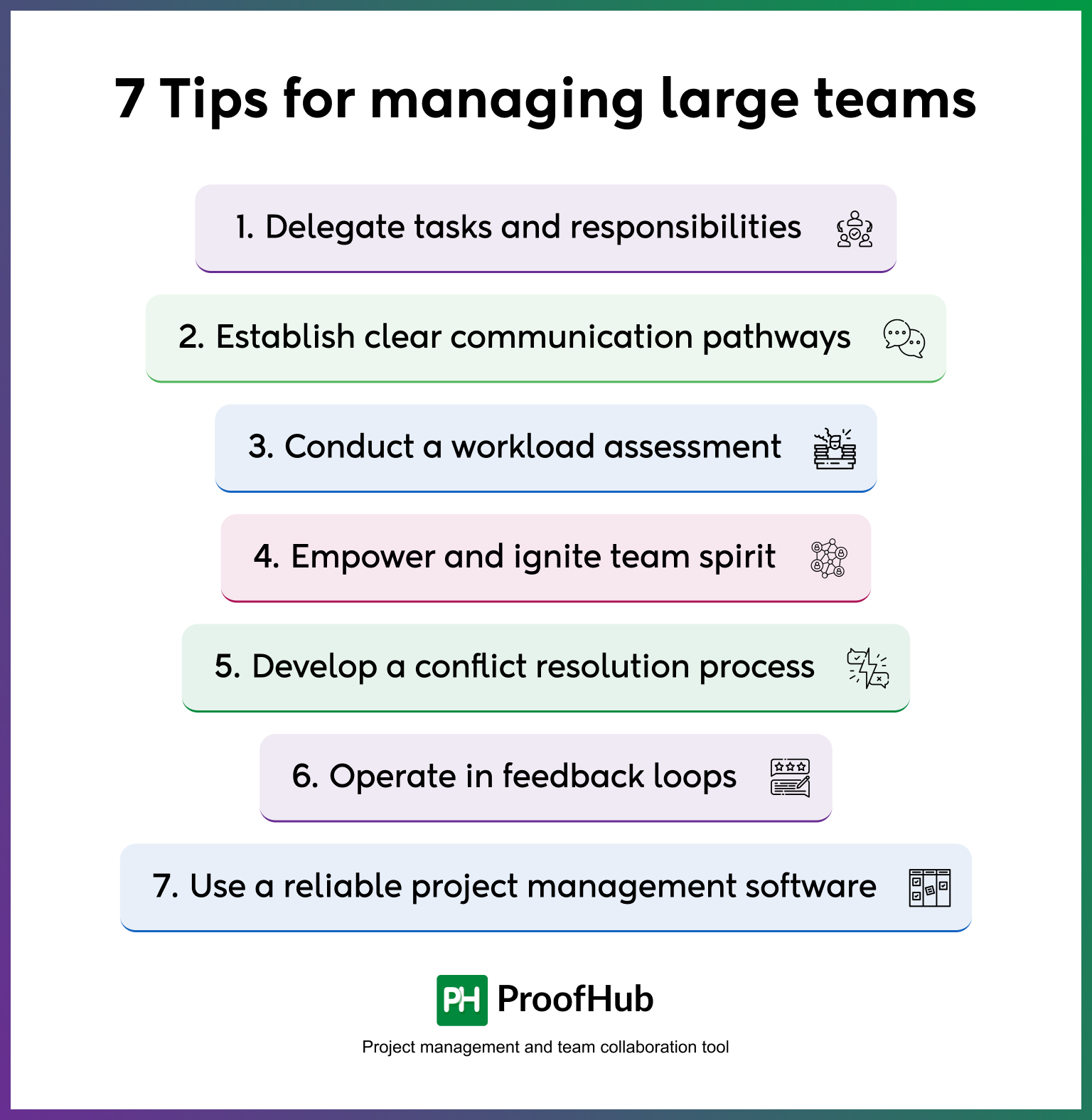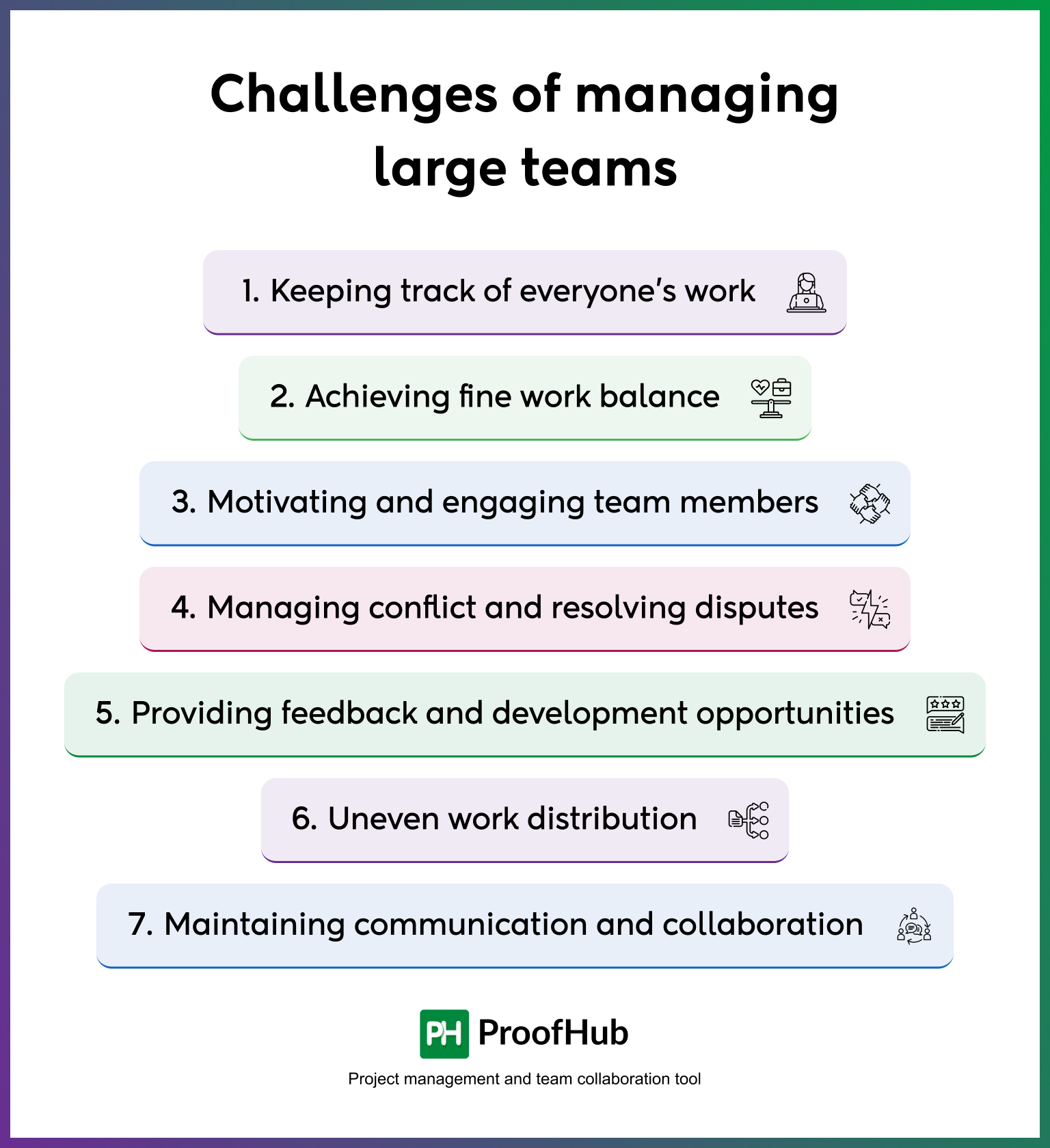Introduction
Managing large teams can be tough for leaders. It might feel hard to handle at times, but it is possible to get better at it with some proven tips.
Many of us have been in this position, where increasing headcount and overseeing sizeable units presents unique challenges.
But navigating through them is the true hallmark of a successful leader.
Whether you’re already handling extensive employee groups or making a transition, are you ready to transform your large team-building and management skills?
Because this article entails not just the challenges but practical solutions to upscale your leadership game in leading big teams.
Read on!
Check out our curated list of 18 best team management software for improved productivity and work quality.
7 Tips for managing large teams successfully
Here are seven strategies that have proved fruitful for me. You can follow these to enhance the effectiveness of your large teams and recognize them as successful teams.

1. Delegate tasks and responsibilities
Delegating tasks provides you the space to handle other managerial responsibilities.
If you keep on shouldering every task on your own, you lose the greatest amount of your time focussing on something less impactful. But when you delegate tasks and responsibilities, you can direct your attention toward the highest-priority matters.
Taking it a step further, learning the art of delegating tasks means understanding your team’s strengths and weaknesses. And it is just to ensure that the right task is allocated to the right individual.
2. Establish clear communication pathways
Communication is the key to laying the foundation of a successful business.
Being a manager it becomes the responsibility of a manager to be the driving force in bringing everyone on the same page. Ensure them that your doors are always open and that you are all ears to their concerns.
Not just facilitating communication, but communicating effectively with your team is the other major thing to show your team that you recognize and value their efforts (even in remote work setups.)
3. Conduct a workload assessment
Workplaces, where two categories – overburdened and underutilized exist, are making their way to chaos.
If you lack a clear understanding of who is working beyond their capacity and whose efforts are not being effectively used, then you are creating an imbalanced environment.
However, conducting workload assessment is necessary to promote a culture where employee well-being is nurtured, leaving a positive influence on overall performance.
4. Empower and ignite team spirit
Motivating a team isn’t just bombarding them with a lecture but finding ways to lift their spirit.
Creating and developing opportunities for team members to grow in their capabilities and potential is the best way to boost their confidence in themselves.
However, incorporating team-building activities, even if virtual, is crucial to ensure your team is engaged and connected.
5. Develop a conflict resolution process
Conflicts are likely to happen where diverse minds thrive.
Preparing a conflict resolution process when leading big teams is like constructing a strategic management playbook to address and resolve disputes instantly.
Whether arising from miscommunication, opinion differences, or varying work methodologies, safeguarding your team dynamics from disruption is necessary to cultivate a harmonious environment.
6. Operate in feedback loops
Regular feedback exchange builds trust and adaptability within teams.
Constructive and timely feedback serves as a mirror that reflects on the performance, highlights areas for improvement, and the steps required to excel. You should motivate your team members to embrace those changes and refine their skills and performance for something better.
Apart from that, you should be open to receiving feedback and criticism. Because it is your willingness to change as a leader that is going to earn you their respect and trust.
7. Use a reliable project management software
If you want to have real-time updates with extreme simplicity, the solution is project management software like ProofHub.
Staying on top of everyone’s activities becomes easy with this software which allows you to stay in sync with task updates using Kanban boards, employees’ performance using in-depth reports, and project progress using Gantt chart.
Not only this, you can even set clear goals and expectations, leaving no room for confusion and blame game. Everyone is accountable for their work.
Challenges of managing large teams
Some common challenges that make team management a bit tricky are –

1. Keeping track of everyone’s work
Recall the days when being up-to-date on the entire team’s work status gets too overwhelming. As the team expands, the sheer volume of projects, employees, and tasks increases to another level, which becomes too intricate to handle.
Monitoring contributions and progress at the ground level, tracking who is responsible for what, and potential setbacks that derail the project are too much to juggle when trying to be on top of everything.
2. Achieving fine work balance
Getting work done is an art. It is a state where every employee is appropriately challenged and pushed to work hard but not to the extent where it seems overwhelming and unmanageable.
The challenge lies in having a deep understanding of individual capacities and striking a balance where motivating the team to achieve its full potential feels more like a boost than a burden.
3. Motivating and engaging team members
As the team size grows, employee motivation at an individual level becomes extremely difficult. Not being able to have a one-on-one conversation, makes employees feel disconnected.
When a large cohesive team splits into fragments, disengagement, and poor team spirit lead to the derailment of the broader organization goals. Getting them on track is another challenge that follows.
4. Managing conflict and resolving disputes
Differences in opinions are everywhere. As soon as the people count increases in teams, so do the chances of having clashes and communication breakdowns.
But what stance you’ll take in such matters is what will matter the most. So, does that mean you should let it bygone? No, it is only with the effort to improve workplace relationships that can you resolve interpersonal conflicts.
5. Providing feedback and development opportunities
Offering feedback is the other complexity that managers often fail to address while supervising large teams. Employees feel less confident and disheartened about not receiving tailored feedback.
They feel less valued and overlooked, which undermines their trust in you and the organization overall. The lack of individualized growth support hinders their professional growth and morale.
6. Uneven work distribution
Resource leveling is one thing that can mess up your overall business operations. When managers fail to delegate tasks effectively, they often tend to fill up tons of files on tables that are already loaded.
When you don’t have a single source of task allocation details, you don’t get the complete picture of overburdened and underutilized team members. This imbalance fuels the fire of dissatisfaction and inefficiency.
7. Maintaining communication and collaboration
Another major pitfall that becomes a solid reason for project failure is poor team communication. And with the scattered workforce becoming a trend these days, the void between the communication channels is widening even more.
The problem starts to become wild when information silos start to build up because of either employees working in isolation or being reluctant to share information. This leads to miscommunication and conflicts.
Explore the top 55 online collaboration tools that keep teams together
How to manage a large team with a project management software – ProofHub
If managing bigger teams is becoming a constant headache for you, then ProofHub’s collaborative project management software is the sure-shot solution to your issues. No matter if your team is spread out or vibing in the office premises, ProofHub brings everyone and everything under one roof.
So, now if your burning question is, what makes ProofHub unique?
Here are all the details.
- The all-in-one architecture takes care of everything from planning to progress tracking, through distinct views.
- Task delegation with ProofHub is easy. Its bulk allocation feature allows you to assign multiple tasks to multiple team members simultaneously.
- Communicate one-on-one or engage in group chats seamlessly with anyone, anywhere through the built-in chat feature.
- Say goodbye to leaving feedback in long email threads, and leave feedback right on documents and files using online proofing.
- Customize your workflow to your team’s operations for enhanced project management.
- You can add custom roles to define the responsibilities and match them to your organizational flow.
- Make company-wide announcements to celebrate and acknowledge team achievements.
- The flat-fee pricing structure of ProofHub is another fascinating feature that makes employee onboarding easy. No per-user fee.
Manage teams of any size with ProofHub – the best project management software that provides you with scalability.
Manage teams of any size with ProofHub – the best project and team management software that provides you with scalability.
Wrapping up
Team management is challenging and demanding.
While I agree with the fact that leading a large team can bring out the frustration and stress in you at times. Countless tips for managing large teams are there to help you keep teams’ morale high amid the ever-changing work environment.
And consider ProofHub your ally in the face of dynamic challenges of team management.
Lastly, never forget to be patient and understanding. These are the keys to standing out and meeting your employees’ expectations.
FAQs
What is the best strategy for managing a large team?
The best strategy for managing a large team greatly depends on the organization’s culture, employee dynamics, and other internal factors that influence team spirit.
What is the best project management software to manage large teams?
ProofHub is the best all-in-one collaborative project management software that excels in helping managers handle big substantial groups. Its flat-fee pricing model shows its commitment to simplifying the management of large teams.

